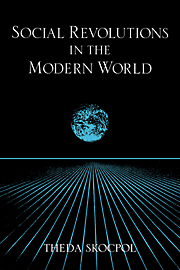Book contents
- Frontmatter
- Contents
- Acknowledgments
- INTRODUCTION
- I DOING MACROSCOPIC SOCIAL SCIENCE
- II MAKING SENSE OF THE GREAT REVOLUTIONS
- 4 Explaining revolutions: In quest of a social-structural approach
- 5 Revolutions and the world-historical development of capitalism
- 6 France, Russia, China: A structural analysis of social revolutions
- III A DIALOGUE ABOUT CULTURE AND IDEOLOGY IN REVOLUTIONS
- IV FROM CLASSICAL TO CONTEMPORARY SOCIAL REVOLUTIONS
- CONCLUSION
- Index
5 - Revolutions and the world-historical development of capitalism
Published online by Cambridge University Press: 05 June 2012
- Frontmatter
- Contents
- Acknowledgments
- INTRODUCTION
- I DOING MACROSCOPIC SOCIAL SCIENCE
- II MAKING SENSE OF THE GREAT REVOLUTIONS
- 4 Explaining revolutions: In quest of a social-structural approach
- 5 Revolutions and the world-historical development of capitalism
- 6 France, Russia, China: A structural analysis of social revolutions
- III A DIALOGUE ABOUT CULTURE AND IDEOLOGY IN REVOLUTIONS
- IV FROM CLASSICAL TO CONTEMPORARY SOCIAL REVOLUTIONS
- CONCLUSION
- Index
Summary
Karl Marx's theory of revolutions was elegant, powerful, and politically relevant because it linked the causes and consequences of revolutions directly to the historical emergence and transcendence of capitalism. Nevertheless, events and scholarship since Marx's time show that there is a need for revised ways of understanding revolutions in relation to the world-historical development of capitalism. In the spirit of furthering theoretical efforts to this end, we propose to do two things in this short paper. First, we shall identify the essential elements of Marx's original theory of revolutions and indicate some important ways in which his ideas fail to square with the actual patterns of revolutions as they have occurred historically. Then we shall suggest some alternative analytic emphases that must in our opinion underlie explanations of major types of historical revolutions and efforts to situate them in relation to the development of capitalism. In doing these things, we shall draw especially upon our own comparative historical investigations of social revolutions in France, Russia and China and of bureaucratic revolutions from above in Japan and Turkey, as well as upon the work of scholars such as Immanuel Wallerstein, Otto Hintze, and Daniel Chirot, who have explored transnational aspects of capitalism as a world system.
Before we launch into critical discussion, let us briefly underline some aspects of Marx's approach to revolutions that are still compelling and which we want to recapitulate in our own approach.
- Type
- Chapter
- Information
- Social Revolutions in the Modern World , pp. 120 - 132Publisher: Cambridge University PressPrint publication year: 1994



